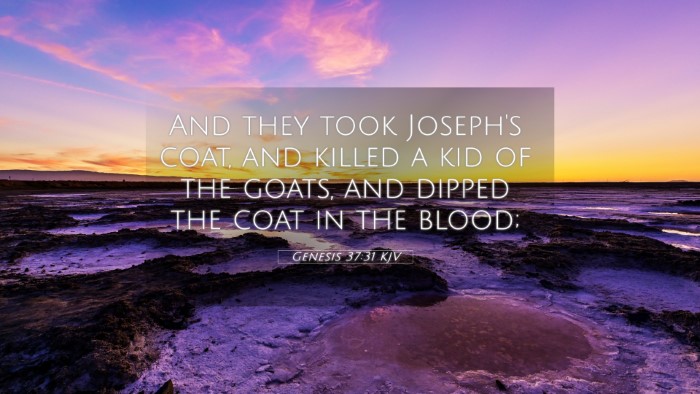Understanding Genesis 37:31
Genesis 37:31 reads, "And they took Joseph's coat, and killed a kid of the goats, and dipped the coat in the blood."
This verse is pivotal in the narrative of Joseph, one of the patriarchs of Israel. It illustrates a significant act of deception by his brothers, highlighting themes such as betrayal, familial discord, and the consequences of envy.
Commentary Insights
The interpretations from various public domain commentaries shed light on the layers of meaning within this verse:
-
Matthew Henry's Commentary:
Henry emphasizes the extreme measures of Joseph's brothers, pointing out that they took his coat—a symbol of their father's love for Joseph—and stained it with goat's blood. This act of deception reveals their intense jealousy and foreshadows the future trials that Joseph will endure.
-
Albert Barnes' Notes:
Barnes highlights the significance of the 'coat of many colors' as not just a physical garment but also as a representation of Jacob's favor towards Joseph. The bloody coat would serve as a poignant tool in their scheme to convince Jacob of Joseph's demise, illustrating how envy can lead to destructive actions.
-
Adam Clarke's Commentary:
Clarke elaborates on the symbolism of the goat's blood, noting it is reminiscent of sacrificial atonement. By using a sacrificial animal to cover their sin of deceit, the brothers unwittingly set the stage for the redemptive themes seen later in the Bible.
Thematic Connections
This verse is crucial for understanding the larger narrative of Joseph and how it interweaves with themes of betrayal, redemption, and providence throughout the Scriptures. The actions of Joseph's brothers not only affect their family, but also set in motion God's plan for the Israelites.
Cross-References
Below are Bible verses that connect with Genesis 37:31, enhancing its understanding through thematic parallels:
- Genesis 37:32-33 - This immediately follows the verse, as the brothers present the stained coat to Jacob, further highlighting the deceit.
- Genesis 39:7-10 - Joseph's story continues, illustrating his trials and temptations as a slave in Potiphar's house, forged by the betrayal of his brothers.
- Matthew 27:3-4 - Judas Iscariot, driven by greed and remorse, returns the silver, reflecting the theme of betrayal similar to that of Joseph's brothers.
- Romans 8:28 - This emphasizes the idea that God can work through all circumstances, including those stemming from betrayal, for good.
- John 15:20 - Jesus speaks of the world hating His followers, paralleling the familial hatred seen in Joseph's narrative.
- Hebrews 11:22 - Joseph's faith in God's promises is shown, even amid betrayal, emphasizing that God's plans are sovereign.
- Psalms 105:17-19 - These verses recount Joseph's hardships, reinforcing the point that suffering can lead to future glory as part of God's plan.
Concluding Thoughts
Genesis 37:31 serves as a striking reminder of the destructive power of envy and the depths to which humanity can sink. By cross-referencing this verse with others in both the Old and New Testaments, we uncover profound truths about betrayal, redemption, and divine providence. Learning to interpret and explore these connections can deepen our understanding of Scripture significantly and enhance our biblical study.
How to Use Cross-References
Engaging with cross-referenced passages enriches our comprehension and demonstrates the unity of God's Word. Believers are encouraged to utilize tools for Bible cross-referencing and Bible concordances to identify these connections effectively.
Further Study Suggestions
For further exploration, consider the following:
- How to find cross-references in the Bible, enhancing your scripture study.
- Identifying connections between Old and New Testaments for a holistic understanding.
- In-depth comparative study of the Gospel narratives in relation to Joseph's story.
Ultimately, Genesis 37:31 and its surrounding context provide a powerful reminder of the complexities of human relationships and God's overarching sovereignty. By studying this verse within its wider biblical narrative, we can gain greater insight into our own lives and faith.





